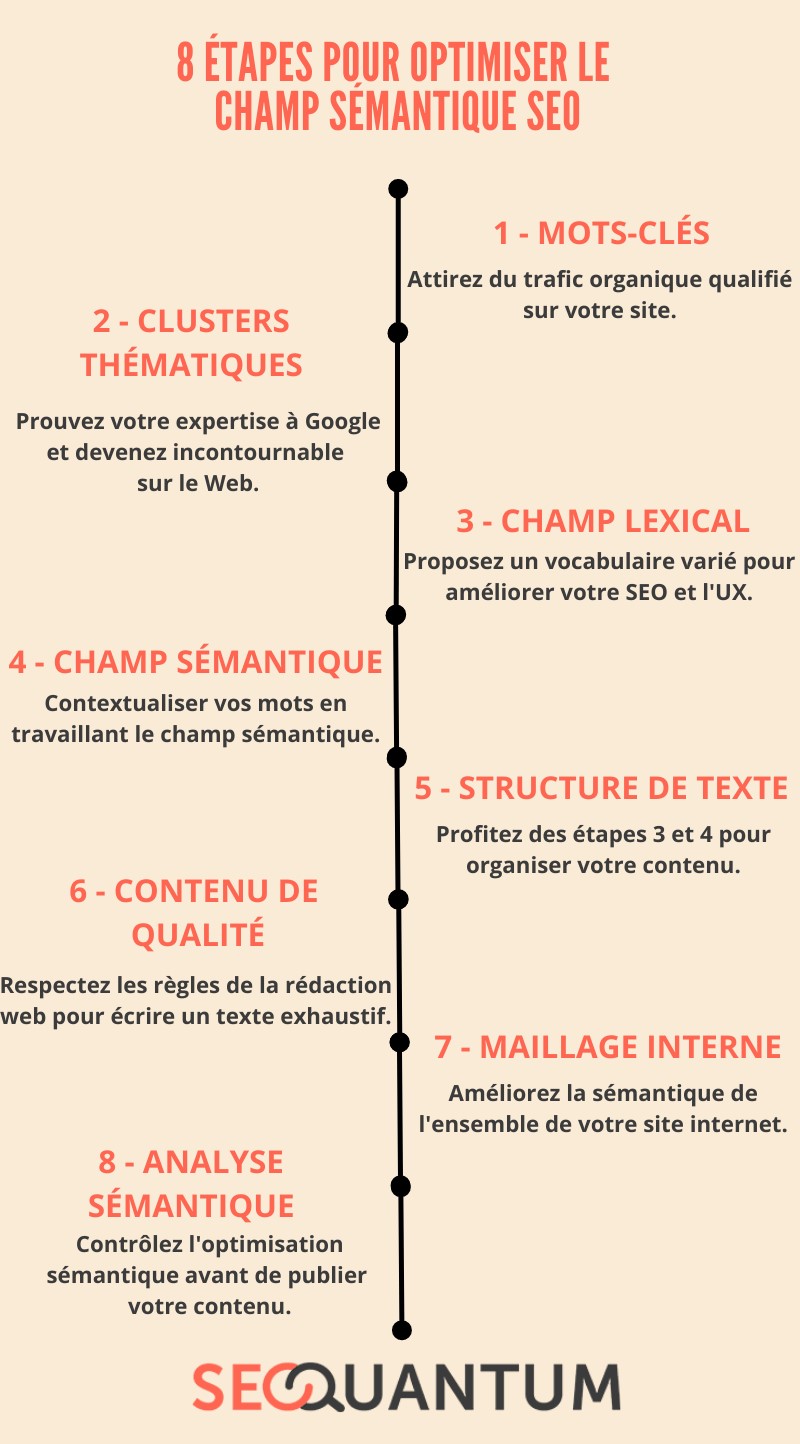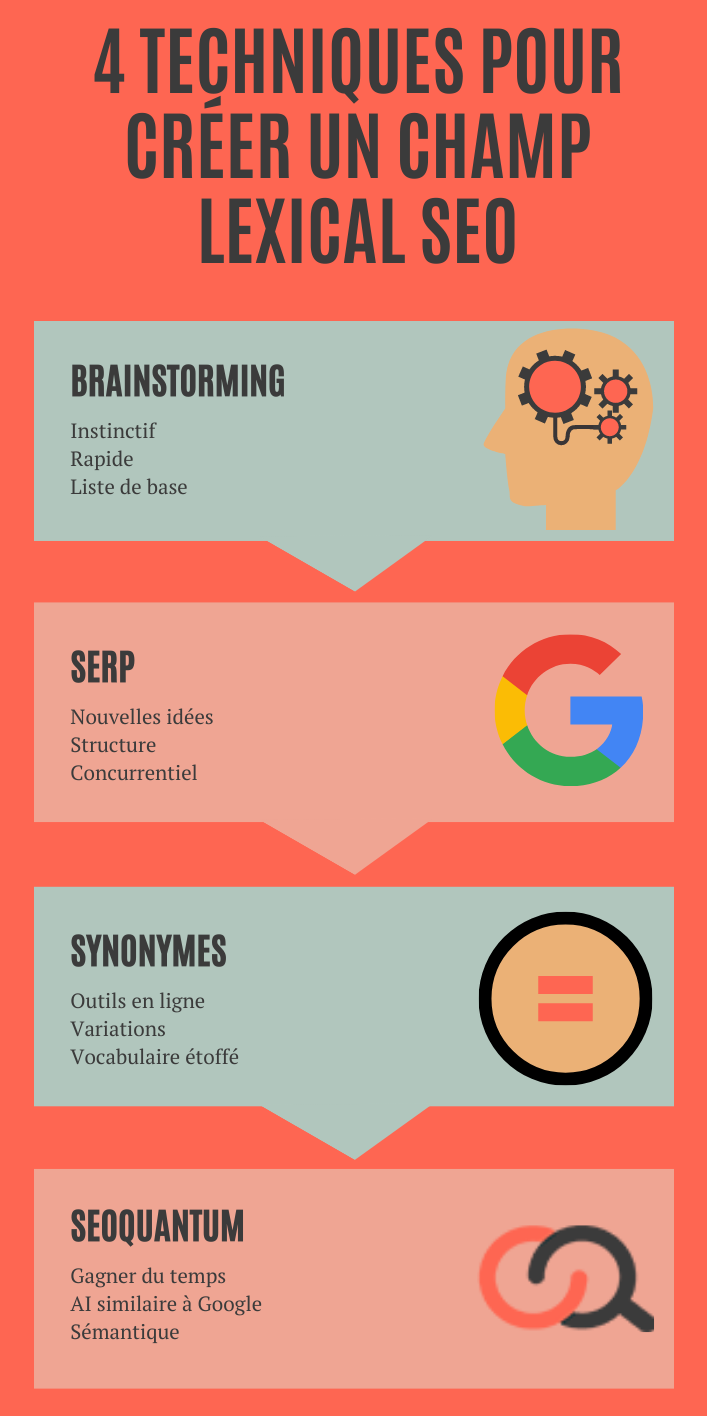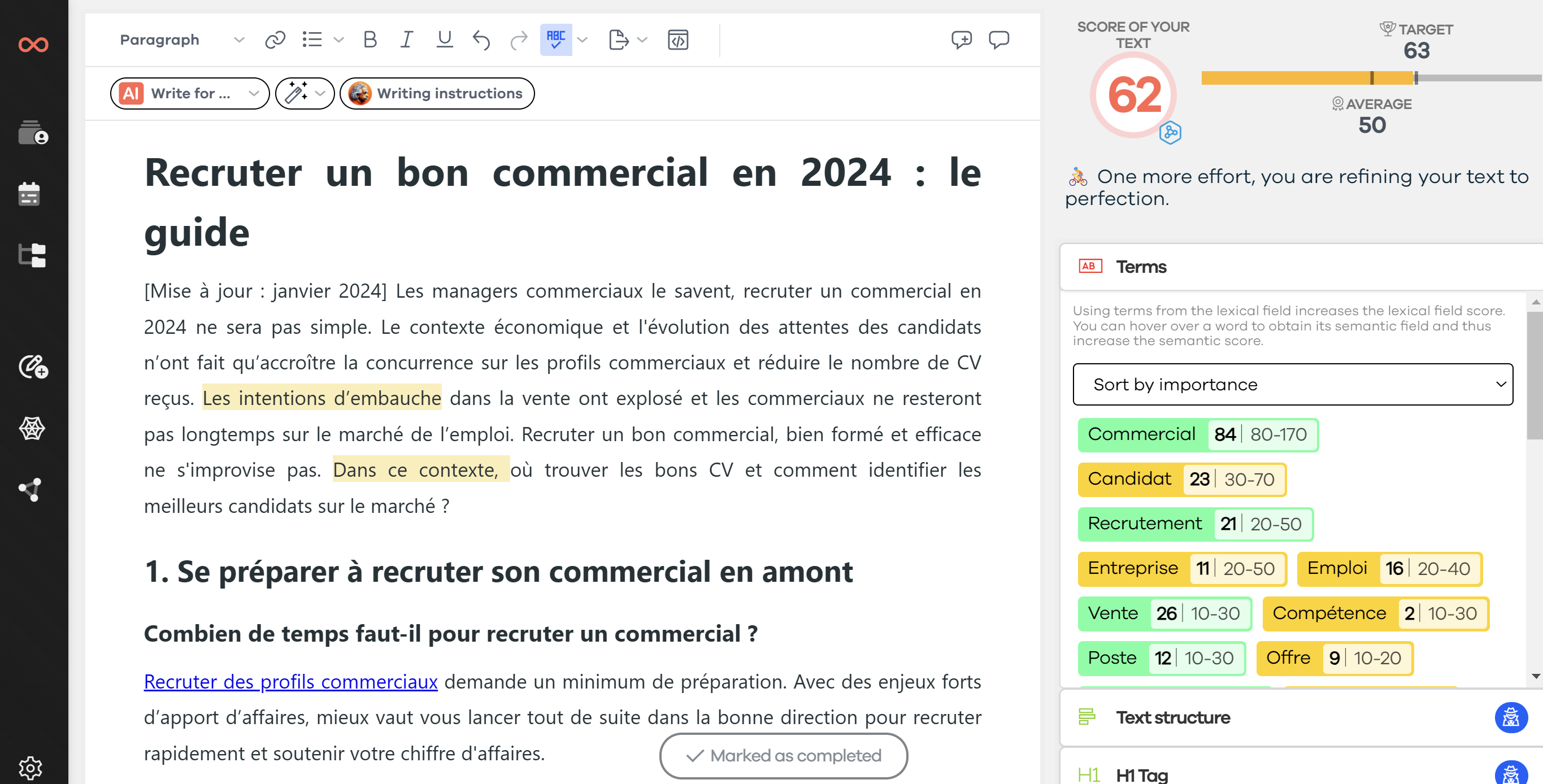Do you know the difference between lexical field and semantic field? Do you know how to optimize your SEO semantic field to please your readers and improve your organic search ranking? We will cover all of this in this article! If you only have 2 minutes, simply add this post to your favorites to come back to later and quickly check out the infographic below.
🚀 Quick read: SEO semantic field optimization at a glance

🔎 Definition of SEO semantic field
The semantic field is a concept widely used in literature. It is a writing technique that allows you to give meaning to the words you use, as their meaning can be very different depending on the context. This concept was then adopted in organic search when quality content writing became an essential criterion.
To illustrate this definition of SEO semantic field, let's take the example of the word "folder." It can refer to the back part of a seat, a document, a lightweight cardboard folder, or a piece of harness. If your theme is chairs, you should then complement this term with words like "seat," "sitting," "back," "room," or "house."
Thus, a word is accompanied by related terms and expressions to give meaning to your text. First, this allows your reader to better understand the topic being discussed. Moreover, indexing robots can better interpret your content. Working on the SEO semantic field is therefore essential for the user experience (UX) and search engine ranking.
🧐 Difference between SEO semantic field and lexical field
In contrast to the semantic field, the lexical field is a family of analogous words. Although this concept may seem close, it is not the same. Indeed, the lexical field describes the atmosphere, while the semantic field specifies the information.
If I take the previous example, you should now use vocabulary that encompasses your theme: "table," "leg," "wood," "adjustable," etc. Therefore, the semantic field allows you to contextualize your lexical field. Thus, to write quality content, the key is to use these two techniques when writing an SEO text.
💥 Importance of semantic field in organic search

In 2013, the update of Google's algorithm known as "Hummingbird" forever revolutionized the world of web writing. Content quality has since become an essential criterion for organic search. Keyword stuffing was over, and web copywriters had to work on the semantics of texts to please Googlebots.
Since then, SEO professionals have started implementing SEO strategies revolving around this concept. First, the notion of "topic cluster" emerged. It was about creating the semantic architecture of websites (consistency between all pages). Later, the concept of "keyword clustering" was invented to further enhance the affinity between each content on the site.
In 2020, Google once again confirmed the importance of the semantic field in SEO. By publishing the description of their quality criteria (known as "Google EAT"), it was now written in black and white that the expertise of content was (among other things) reinforced by the choice of the semantic field.
According to this document (in English), this practice is essential to ensure reading comfort and protect users, which is paramount in the eyes of the search engine leader. Thus, thanks to the semantic field, you:
- position your pages on more queries (SEO);
- attract more organic traffic (ROI).
🥇 8 steps to optimize SEO semantic field

Do you want to improve the positioning of your content on Google's search results pages? Here are the 8 steps to follow to ensure good SEO optimization of the semantic field!
1. Research keywords
Before you can work on your lexical field and develop your semantic field, you need keywords (main and secondary queries). This is the foundation of SEO content creation! To find the list of keywords that will boost your search ranking, I recommend the following steps:
- brainstorming;
- Google search (related queries and frequent questions);
- SEO competitor analysis;
- use of SEO tools (SEMRush, Keywordtool, Ubersuggest and of course the free SEOQuantum Keywords Suggests tool).
2. Create keyword clusters
Once you have your main keywords, you can further expand your scope by defining keyword clusters. This method allows you to cover an entire topic and demonstrate your expertise to Google. By doing so, you increase your chances of appearing in the SERP for a whole set of keywords for which you are now recognized as an expert.
Moreover, your website fully meets the search intent of your audience, which helps retain your traffic and build reader loyalty. This also promotes recommendation of your business! As a result, you might even hope to get free backlinks without having to spend a considerable amount of time!
3. Work on the lexical field
In SEO, the lexical field is entirely associated with the semantic field! You must therefore conduct a thorough search of the vocabulary to use throughout your content. Here are 4 ways to expand your lexical field:
- reflection (instinctive and fast);
- analysis of Google search results pages (new ideas and help with structure);
- search for synonyms (variation and reading comfort);
- SEOQuantum tool (time-saving).

4. Develop the SEO semantic field
Give meaning to your words by using related terms! As a result, you will associate words in the same sentence to clarify the theme for Google and provide informative content to your readers. Defining a comprehensive semantic field is, however, more challenging than for the lexical field.
To help you with this task, using our tool is incomparable to what is currently available on the market. If I take the example from the beginning of this article once again, here is a sample of the suggestions I get.

5. Structure the SEO text
The previous two steps allow you to group the words to use in distinct themes. Thus, it is easy to structure your blog article or any page on your website. You can then cover the topic in its entirety and, as a result, meet the needs of Google and users.
Indeed, this methodology allows you to create a writing plan that favors organic search. Also, remember to integrate your keywords and their variations in the "hot zones" to simplify reading and improve your SEO:
- title (H1 tag);
- introduction (or lead);
- subtitles (H2, H3 tags, etc.);
- metadata (title and description).
6. Write quality content
Now that you have done all the preliminary research and have your writing plan, you can (finally!) start writing your SEO content. To do this, there are two schools...
- Instinctive writing: You write naturally, without worrying about optimizing your content. You will correct your text later (during proofreading) and ensure its semantic quality at step 8.
- Technical writing: You carefully place the words from your lexical field and work on the semantics of your sentences as you progress. Note that proofreading and semantic analysis will always be necessary!
These two writing methods are equally valid and depend mainly on your personality and level of knowledge. The first writing method is faster but requires a longer check. On the other hand, with the second technique, you write more slowly but have less optimization to do afterward. Ultimately, the time needed to write a good SEO text is more or less the same!
7. Optimize internal linking
Although internal linking is not part of the semantic field per se, this element is essential for the search ranking of all your web pages. Indeed, creating a link between your content plays a key role in SEO. It is also an important element to check when conducting a semantic audit of your site.
Once again, this step can be performed during content writing or afterward, depending on your personal method. However, to create relevant linking during writing, you must have an excellent knowledge of all the texts already published on the site. If this is not the case, you can perform this step by browsing all the site's pages after writing.
8. Analyze semantics
Before even publishing your text, you should absolutely check its semantic optimization. To do this, simply use the SEOQuantum semantic analysis tool. Note that your goal is not to achieve 100% optimization. In fact, it's impossible!

So, what you want is to achieve a score equal to or higher than that of your competition. This way, you can be sure that the SEO semantic field perfectly meets Google's expectations. Once this final step is completed, you can finally publish your text and start your next writing 😊.
🎬 Conclusion
1. Research keywords.
2. Create keyword clusters.
3. Work on the lexical field.
4. Develop the semantic field.
5. Structure your text.
6. Write quality content.
7. Optimize internal linking.
8. Analyze semantics before publishing.
What about you? Do you have other techniques for developing your SEO semantic field? What tools do you use to achieve this?
Need to go further?
If you need to delve deeper into the topic, the editorial team recommends the following 5 contents:

